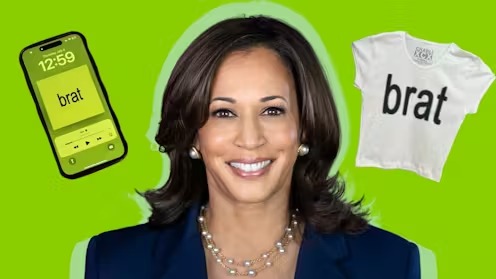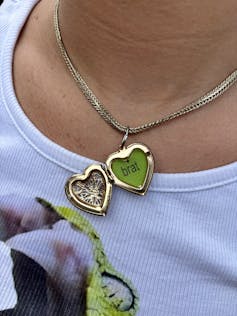When Kamala Harris was confirmed as the new Democratic party nominee, a host of celebrities rushed to endorse her – but one has had significantly more attention than the others. Singer Charli XCX endorsed Harris in her signature minimalist way by posting “kamala IS brat” on X.
The post went viral almost instantly, with millions of views, and Harris’s own X account switching its colours to neon chartreuse – the shade of the album cover for Charli’s new album, Brat.
The internet thrives on novelty and inside jokes. That’s partly why memes – a fairly middle-aged phenomenon that first originated in the 1990s – are still going strong, while we’ve long seen the back of Bebo, Vine and Clubhouse (what are those, you ask? My point exactly).
The popularity of memes means they have become an important vehicle for political communication. In my research, I have identified four roles of memes: political mindbombs, fast-food media, everyday slang and a soothing device. Charli XCX’s endorsement of Kamala Harris is a perfect “political mindbomb”.
The term “political mindbomb” was coined by the co-founder of Greenpeace Bob Hunter, who claimed that a powerful visual message can cut through the noise and affect the minds of people – not immediately, but in the long run. He used the example of a photo of a bleeding whale trying to escape a hunting ship. He sent the heartbreaking picture to media outlets to affect the minds and feelings of readers all over the world, and hopefully encourage them one day to vote or protest against whaling.
When Kamala Harris was announced as “brat”, the suit-wearing, experienced and sharp vice-president received a gift of vibes, rather than something concrete. Charli XCX posting a serious paragraph on why Harris is suited for the top job in the country would not have created the same effect of viral potency.
kamala IS brat
— Charli (@charli_xcx) July 22, 2024
The three words, written by a 31-year-old British pop singer, are cryptic for some internet users. You need to have been following the emerging coverage of Charli’s album and the subsequently coveted brat aesthetic in the likes of Vogue this July to understand what exactly is being talking about. But as with any good meme, “brat” is defined by incompleteness.
When I explain memes to my students, I often use the metaphor of a half-baked joke. A good meme requires the reader to complete the sentence and make sense of why the concoction of an image with over-imposed text, for example, is supposed to be funny, irreverent or sarcastic. You need to know some context, some popular culture, some internet or lifestyle slang. A good meme is not for everyone, and this closed-community feel makes them precious.
The aesthetic of Brat has resonated with fans, leading many to create their own merchandise. Dupe/Emily Patnaude, CC BY
Linking one of the most influential women in the US today with “that girl who is a little messy and likes to party and maybe says some dumb things some times”, as Charli XCX defines “brat”, is a bold move that seeks to inject fun and relatability into Harris’ public persona.
Harris’s team may be embracing memes because of the complicated effects of memes and viral culture on political candidates in the past.
In 2016, the treatment of memes by the Democrats could be called heavy handed. Many now associate the “Pepe the Frog” meme – a laid-back green cartoon frog known for the speech bubble “feels good man” – with right-wing nationalism. But it started off as a humble meme about social awkwardness before rising to prominence when Hillary Clinton’s office released a post aligning Pepe the Frog with the alt-right movement, cementing its cultural position.
In another instance, Labour politician Ed Miliband’s awkward eating of a bacon sarnie, generally associated with working-class cafes, generated a whirlpool of memes that questioned his relatability to the general public, and may have cost him the UK elections.
A word of caution, though: memes are always subversive, they cannot communicate complex and progressive ideas with consistency. Their very nature of sarcasm, irony and jester-like playfulness makes them a dangerous tool for a politician. They can quickly be turned against a person who thought memes would work in their favour. Having said that, riding a bit of a viral wave of awe and surprise, and exploring the hidden playfulness of a serious political candidate, does feel rather “brat” – however you decode it.



 Trump’s Iran Strikes Spark War Powers Clash in Congress
Trump’s Iran Strikes Spark War Powers Clash in Congress  UBS Boosts Chinese Tech and AI Stocks for 2026 as Sector Eyes Strong Growth
UBS Boosts Chinese Tech and AI Stocks for 2026 as Sector Eyes Strong Growth  Marco Rubio to Brief Congress After U.S.-Israeli Strikes on Iran
Marco Rubio to Brief Congress After U.S.-Israeli Strikes on Iran  Trump to Attend White House Correspondents’ Dinner 2026, Ending Long Boycott
Trump to Attend White House Correspondents’ Dinner 2026, Ending Long Boycott  U.S. Military Strikes on Iran Complicate Xi-Trump Summit and Expose China’s Energy Risks
U.S. Military Strikes on Iran Complicate Xi-Trump Summit and Expose China’s Energy Risks  Middle East Conflict Escalates After Khamenei’s Death as U.S., Israel and Iran Exchange Strikes
Middle East Conflict Escalates After Khamenei’s Death as U.S., Israel and Iran Exchange Strikes  Iran Detains U.S. Citizens Amid Escalating Conflict With the United States and Israel
Iran Detains U.S. Citizens Amid Escalating Conflict With the United States and Israel  Booked to travel through the Middle East? Here’s why you shouldn’t cancel your flight
Booked to travel through the Middle East? Here’s why you shouldn’t cancel your flight  The strikes on Iran show why quitting oil is more important than ever
The strikes on Iran show why quitting oil is more important than ever  Why did Iran bomb Dubai? A Middle East expert explains the regional alliances at play
Why did Iran bomb Dubai? A Middle East expert explains the regional alliances at play  Failure of US-Iran talks was all-too predictable – but Trump could still have stuck with diplomacy over strikes
Failure of US-Iran talks was all-too predictable – but Trump could still have stuck with diplomacy over strikes  Does international law still matter? The strike on the girls’ school in Iran shows why we need it
Does international law still matter? The strike on the girls’ school in Iran shows why we need it 






























